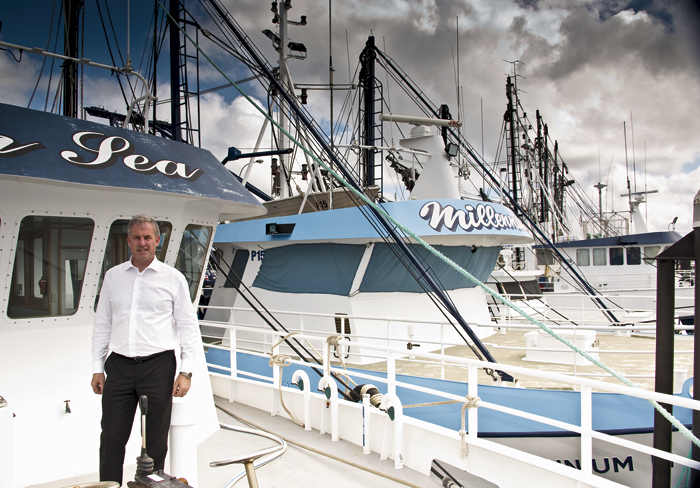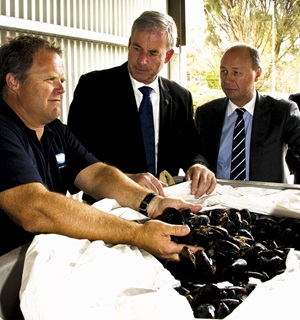At the top of the new Australian Government’s ‘to do’ list is wider recognition of the good work it is doing in the area of fisheries management, and improving engagement between industry and the broader community
 Senator Richard Colbeck took to the water while attending the 2013 Seafood Directions Conference.
Senator Richard Colbeck took to the water while attending the 2013 Seafood Directions Conference.Photo: Steven Davies
By Sarah Clarry
The senate wing of Parliament House is a long way from Tasmania’s River Derwent, but the fishing rod propped in the corner of his office is a reminder of Federal Senator Richard Colbeck’s long-standing affinity with the sea.
The new Parliamentary Secretary to the Minister for Agriculture spent many happy days fishing from a ‘tinny’ in the River Derwent as a young boy, and later stalking trout in the creek on his farm in Wilmot; skills and experience that he notes are important to many Australians.
Now that he is professionally involved and has national responsibility for all three sectors of the fishing industry (commercial, indigenous and recreational), he says his vision is to improve engagement and acceptance of an industry that is under siege.
“You constantly hear bad stories. But we’ve got a good story to tell about our fisheries here in Australia; we’ve done a lot of hard work and there’s been a lot of pain as part of that process. That needs to be recognised,” Senator Colbeck says.
Senator Colbeck acknowledges that a small number of individual fish stocks need work to improve. But he insists we need to get beyond a perspective based on what is happening in other parts of the world.
Growing and developing the industry (wild catch and aquaculture), investing in research, quantifying the economic and social contribution of the recreational sector, addressing the priorities of the FRDC’s Indigenous Reference Group, recognising OceanWatch as a natural resource management (NRM) group and resolving market access issues are some of the priorities for his government’s first term in office.
Growth and development
Senator Colbeck says increasing production from both wild catch and aquaculture will be essential if Australia is to help feed the growing world population.
“I think that there are some wild-catch fisheries that aren’t as developed as they could be yet; we need to do the scientific work to underpin confidence in expanding those,’ he says.
“I’m also particularly interested in the development of aquaculture. Our policy is to develop a national aquaculture strategy and we will start on that soon.”
Senator Colbeck cites opportunities for growth in the Atlantic Salmon (Salmo salar) industry in Tasmania, the shellfish and abalone industries around the country, and for the prawn industry in the northern part of Australia.
“There hasn’t been a new prawn farm in Queensland for 10 years or more. I’d really like to help these industries because they provide significant opportunities for regional development,” he says.
Engaging the states and territories to harmonise planning and access will be key to growing these sectors.
Part of the broader federal government policy is to increase investment in research and development for primary industries. Fisheries will access a portion of the $100 million earmarked in the forward budget estimates for that purpose. This includes $5 million to target invasive marine species.
The investment will help with the goals of growth and sustainability, while the research findings help to give the broader community the confidence to know they are eating safe and sustainable seafood.
Indigenous fishing sector
To ensure fair access for the indigenous fishing sector, Senator Colbeck will consult with Northern Territory Senator Nigel Scullion, Minister for Indigenous Affairs, who is a former commercial fisher. He will also work with the FRDC’s Indigenous Reference Group.
“When you look at the broader fisheries strategy, part of the challenge is to work out who accesses what, where, and in what proportion. There’s been a process through the FRDC for Indigenous engagement. We want to actively pursue that as part of a broader stakeholder engagement process,” Senator Colbeck says.
Recreational fishing sector
The Australian Government has also given an undertaking to work with the recreational sector to build better lines of communication. It is important that all sectors are able to be brought together and discuss key issues.
A key issue that needs to be addressed for the recreational sector is the collection of data. This will require coming up with consistent ways that data can be collected on not only the social and economic impact of recreational fishing, but also participation and catch. This information is important for the long-term management of our fisheries.
OceanWatch
Under the new Australian Government the marine sector now has its first formally recognised NRM agency – OceanWatch.
OceanWatch is a not-for-profit organisation that focuses on practical solutions to environmental problems affecting coastal environments and estuaries, with programs to enhance fish habitats and improve water quality.
Although primarily aligned with the commercial fishing sector through its extension around sustainable fishing technologies, OceanWatch has already been working with Indigenous communities in the Gulf of Carpentaria on the GhostNets program.
Senator Colbeck also sees potential for it to work with the recreational fishing sector. He envisions OceanWatch as the marine counterpart to the Landcare movement, inspiring new attitudes and behavioural change in fishing communities, as Landcare has in farming communities.
Market access
Senator Colbeck acknowledges that there are many frustrations for the commercial fishing sector around access to markets in South-East Asia and says resolving these access issues is important for the industry.
For example, the 15 per cent tariff on Australian rocklobsters imported into China immediately puts Australian producers at a significant disadvantage, particularly when their product is worth $90 per kilogram.
“The best way we can fix these things is to finalise our trade arrangements and agreements. We’re openly pushing ahead with our free trade negotiations with China, Japan and South Korea – China being an important one.”
Industry engagement
Senator Colbeck sees room for improvement in the organisation of both the recreational and commercial fishing sectors.
The recreational fishing sector plays an important role in tourism and the economy, with its reach into tackle shops, boat sales, accommodation and employment, but he wants to see them strengthen the structure of their representation.
The commercial sector, too, needs work, he says.
“You’ve got the National Seafood Industry Alliance, you’ve got the Commonwealth Fisheries Association, you’ve got the individual state-based organisations that come up through the National Seafood Industry Alliance. You’ve got individual fishery-based organisations, too. It is still disparate, and that needs drawing together.
“[The commercial sector] wants to have a sustainable fishery that doesn’t cost too much to access. In that context they’re not much different from the recreational fishers.
“They just want to do their job without a whole heap of people beating them up, and they are feeling a bit beaten up at the moment. So there’s some work to do with those representative groups to give them a solid foundation – both commercial and recreational.”
Senator Colbeck says he is not interested in getting into a dust-up between the recreational and the commercial fishers.
“If they end up fighting with each other, they both risk losing the thing they are trying to secure: access to their fisheries, which applies to the Indigenous community as well.”
Something special
 (From left) Andrew Puglisi, Senator Richard Colbeck and SA Senator Sean Edwards at Kinkawooka Mussel Factory.
(From left) Andrew Puglisi, Senator Richard Colbeck and SA Senator Sean Edwards at Kinkawooka Mussel Factory. Photo: Steven Davies
Senator Richard Colbeck’s role provides him with opportunities to sample some of the best seafood Australia has to offer.
“There are some brilliant products on the market out there now. Oysters, mussels, scallops … Atlantic Salmon and Rainbow Trout. Abalone is very special, and rocklobster is a treat. There’s so much that’s good about Australian seafood,” he says.
But Bastard Trumpeter (Latridopsis forsteri), the fish he used to catch as a kid, remains his favourite seafood dish.
“Cooked very simply, the way my mum did it. Seasoned with flour, salt and pepper and pan fried. It’s probably for sentimental reasons, but that’s the one for me.”





